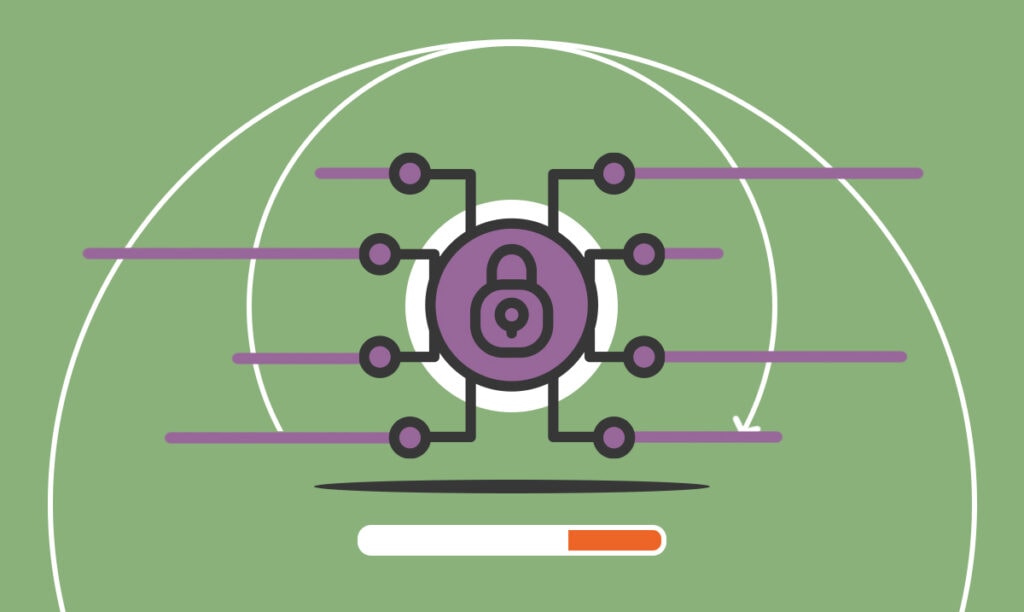Keeping up with several financial goals at the same time can feel like juggling too many things at once. Saving for a home, paying down credit cards ...
294 Cybersecurity Business Name Ideas
Written by: Carolyn Young
Carolyn Young is a business writer who focuses on entrepreneurial concepts and the business formation. She has over 25 years of experience in business roles, and has authored several entrepreneurship textbooks.
Published on April 10, 2024

If you’re starting a cybersecurity business, congratulations! You have an exciting journey ahead. You also have many decisions to make, and one of the most important is choosing your business name.
The name will be the first impression that people will have of your cybersecurity business, so your decision should be carefully considered.
Choosing a winning name is not always easy, but luckily, you’ll find valuable tips and suggestions in this handy guide.
Cybersecurity Business Name Generator
We’ve done some work and come up with some business name suggestions for your cybersecurity business. They’re divided into categories so that you can choose a name befitting your brand’s personality.
Unique
- CipherNet
- Securify
- Vigilantek
- Cybervault
- Intrugard
- Encryptify
- CyberCordon
- Shieldify
- NetFence
- Deflectify
- Block Warden
- Byte Shield
- VirtuShield
- TitanCyber Guardians
- TechThwart Security
- CyberSphere Innovations
- HackArmor Technologies
- IronFence Cybersecurity
- CipherMatrix Solutions
- DefyCyber Guardians
- PhoenixGuard Cyber
Trustworthy
- Securionix
- HackGuard
- DefenSure
- ReliaSec
- TrustLock
- VigilCyber
- CyberNex
- Guardify
- Vigilink
- SafeWard
- TrustFort
- DefenTech
- ShieldMaster Tech
- VigilantCyber
- CyberWall Pro
- TrustArmor Tech
- TechSentinel Pro
- CyberFortress Labs
- SafeNet Innovators
- CodeGuardian Security
- DefenseLink Cyber
Clever
- CypherWise
- Cryptalock
- Safeguardia
- Defendify
- FortiSec
- Encrypta
- HexShield
- ProtecTech
- FireByte
- Defendr
- Securitech
- Tech Vigil
- FortiCyber
- Secure Sphere
- Binary Bunker
- Code Safeguard
- CodeBreaker Solutions
- ShieldByte Security
- HackBlock Defenses
- CyberNinja Guardians
- HackProof Innovations
- NetFortress Guardians
Cool
- VigilX
- Encrypto
- Nuvolock
- CyberNexa
- CipherByte
- Defyware
- CyberHive
- FortiCrypt
- SentryVibe
- Binary Defense Force
- Firewall Phalanx
- Quantum Shield
- Cybernetic Fortitude
- Darknet Sentinels
- Nexus Security Systems
- IronClad Innovators
- Titanium CyberGuard
- VigilantBit Security
- ByteForce Defenders
- InfraSafe Network Guardians
- CypherForce Alliance
- CyberPulse Protectors
Fun
- HackNinja
- CodeFort
- CyberZen
- ByteWarden
- Hack Muse
- CyberLock
- Byte Defender
- Cyber Ranger
- HackShield Pro
- Firewall Force
- Binary Bulwark
- Byte Bandits
- ByteSavvy Security
- StealthCyber Corps
- ShieldLock Solutions
- DefendNet Technologies
- CodeMasters Security
- CyberMatrix Defense
Cute
- ByteFairy
- CyberPaws
- CryptoPup
- CodeWhisk
- BitPanda
- ByteKit
- HackHound
- WebWhisk
- ByteBloom
- WebWisp
- Nano Navigators
- Safety Sprites
- Pawsitive Protection
- CyberGuard Dogs
- VirusViper Cubs
- ByteBee Babies
- PawPrint Defense
- PurrfectNet Security
- CyberPaw Patrol
- OwlWatch Cyber
- Byte-Size Security
- ByteGuardian Solutions
Catchy
- ThreatLock
- Defensia
- Resiliance
- Cypherix
- Safelocka
- SecuriOne
- Vigilanta
- ShieldField
- HackHalt
- SpyGlass Guard
- CryptoLock
- ByteKnight
- ThreatSweep
- CodeAbode
- CipherSentinels
- VirtualSafeguard
- Firewall Forcefield
- CodeWatch Crew
- CyberFort Force
- NetProtect Nexus
- VirtualVault Security
- ThreatMatrix Solutions
Creative
- TitanArmor
- DefendEdge
- GuardCipher
- CyberLocksmith
- Safelynx
- ByteFortify
- DefendX
- CryptoArmor
- PhishProof
- SecurMorph
- CipherForte
- BinaryLock
- KeyDefend
- SecuraByte
- ArmorByte
- Binary Bastion
- DigitalVigilance Labs
- SecureHorizon Dynamics
- CyberHaven Solutions
- CyberArmada Systems
- QuantumSec Labs
- HexaShield Technologies
Information-Related
- CyberVeil
- PhantoGuard
- VaultNet
- ShieldNet
- ThreatWard
- DefenCore
- SentryWise
- GuardZero
- Securio
- VigilCore
- WardenNet
- NovaSentinel
- SecureNexa
- VigorNet Security
- IronVault Technologies
- NovaDefend Security
- CypherGate Systems
- IronCore Security
Vulnerability/Management-Inspired Names
- Wardlock
- Vigilix
- Vaultnet
- GuardVibe
- ImmuniX
- Cybershell
- CipherCheck
- VigilantGuard
- Safeguardr
- Mitigard
- Fortitex
- Enscure
- Armorix
- SecureLinkr
- ThreatAce
- VulneraGuard
- RiskMatrix
- ThreatBlocker
- SecureNetWatch
- CyberSentinel Labs
- RiskProbe Ventures
- ThreatShield Technologies
- VulneraNet Defenders
- RiskArmor Systems
Cybersecurity Consulting Name Ideas
- NetForte
- DefenSec
- DefendIQ
- SecuriByte
- TrustForte
- NetGuardian
- CodeDefend
- CyberNetic
- Cyber Dome
- NetArmor360
- ByteSafeguard
- LockCyber Solutions
- BinaryShield Solutions
- FortiTech Cybersecurity
- SentinelCyber Group
- EliteCyber Guardians
- DefiantCyber Advisors
- VirtuSecure Consulting
- QuantumArmor Consultants
Home-Related
- FortiHome
- SecuNest
- SafeNet Hub
- GuardWise
- ShieldHome
- CyberSafe Haven
- HomeArmor
- VigilHome
- HomeLock Pro
- CyberShield Hub
- SafeHaven Hub
- HomeSafeguard
- SafeHaus Security
- FortifyMyCastle
- GuardMyHaven
- CyberWatch Home
- ShieldedHome Services
- LockHaven Cybersecurity
- DefendMyNest Solutions
- Citadel Cyber Guardians
- SafeAbode Cybersecurity
- HavenShield Security
Fancy
- OpalGuard
- CodeCrown
- EliteDefend
- NovaSecura
- TitanFence
- PrimeSentinel
- Defendrix
- SafeNetics
- StellarDefend
- ZenithCyber
- SecuroVault
- CyberGuardian Elite
- TechDefender Pro
- AegisFortress Tech
- CipherLock Security
- PaladinCyber Services
- NexusSentinel
- CrownShield Technologies
- EliteVigilance Cyber
- SovereignCyber Guardians
- VertexGuard Tech
- PinnacleSecure Tech
- VirtuosoGuard Solutions
- RoyalDefender Cyber
Real-World Cybersecurity Business Names
- McAfee
- Trend Micro
- Palo Alto Networks
- CrowdStrike
- Mandiant
- Fortinet
- Cisco Systems
- Sophos
- Kaspersky Lab
- Rapid7
- Proofpoint
- Darktrace
- Bitdefender
- F-Secure
- SentinelOne
- Qualys
- Trustwave
How to Choose a Name for Your Cybersecurity Business
Here are some key factors to consider when choosing your cybersecurity business name.
1. Check Name Availability
When you come up with name options, you’ll want to make sure they’re available and stand out from competitors.
You’ll need to do a business name search on your state’s Secretary of State’s website to see if the name is available. The search will also show similar names, so you can ensure your name is unique in your state.
Also, go to the United States Patent and Trademark Office’s website to check if the name is trademarked.
2. Check Your State’s Business Name Regulations
Each state has rules regarding business names, often restricting words such as “bank” or “university.” Some states have stricter rules than others; for example, Michigan has a long list of prohibited words. You should be able to find your state’s rules on the Secretary of State’s website.
3. Choose a Name with Relevance
Your name should be relevant to your cybersecurity products or services and reflect your business mission. Often, if you write down a description of your brand identity, you’ll come up with words that have the potential to be used in your business name.
Upon creating an LLC, it’s mandatory to have either “LLC,” “limited liability company,” or “limited liability” as part of its official name. This ensures clarity and compliance with naming conventions for such entities.
4. Keep It Simple
Your name should be easy to say so that it’s more memorable. It should also be easy to spell so that people can search for your cybersecurity business online.
5. Short and Unique
Short, unique, and catchy names tend to stand out. Think Google, which is so catchy and unique that it’s become a verb!
6. Get Feedback
Family and friends can give you an outside perspective on your cybersecurity business name. They can offer suggestions and give you feedback on the names you have in mind.
7. Allow for Expansion
As your business grows, you may want to expand into new products, service lines, or locations, so you don’t want a business name that’s too narrow. For example, “Tennessee Tech Security” is excellent if you don’t plan to scale your business outside that area. If you do, however, then choosing a more-encompassing name, like “Tech Security Gurus,” would be your best bet.
The name should also have timeless appeal. Don’t try to capture a trend — trends continuously change, so you don’t want a name that could become outdated.
8. .com is Best
Generally, domain names ending in .com reflect more credibility than alternatives, so you should reserve this domain for your business name, if possible. Use our Domain Name Search Tool to find an available website name and get the perfect domain name for your business.
9. Use Keywords to Boost SEO
You’ll want your name to be SEO-friendly to boost your organic search engine rankings. Think of what potential customers might search for (e.g., “Data Encryption,” “Cybersecurity,” or “Network Security”) and include those keywords in your business name and on your website.
10. How Does it Sound?
Say the name out loud to see how it rolls off the tongue. Is it pleasant? Does it evoke positivity? You’d be surprised how different a name sounds when you say it compared to when you think it.
11. Appeal to Emotions
Names that evoke positive emotions can create a connection with your target customers. You want them to feel good about your cybersecurity business.
Common Questions
Should I include technical terms in the business name?
While incorporating technical terms can convey expertise, it’s essential to strike a balance. The name should be accessible to a broad audience, including those who may not be familiar with complex cybersecurity jargon. A name that balances professionalism with approachability is often ideal.
Can I use my own name in the cybersecurity business name?
Yes, using your own name in the business name can lend a personal touch and establish credibility, especially if you have a strong reputation in the cybersecurity field. However, consider whether it effectively communicates the nature of your services to potential clients.
Should the name be broad or niche-specific in the cybersecurity industry?
This depends on your business strategy. A broad name might allow for future expansion into various cybersecurity services. On the other hand, a niche-specific name can immediately convey expertise in a specialized area, potentially attracting clients seeking those specific services.
Is it advisable to include the location in the business name?
Including location can be beneficial if you primarily serve a local or regional market. It helps potential clients identify your geographical coverage. However, if you plan to expand beyond a specific area, a more generic name might be a better choice.
Can I change my business name in the future if I’m not satisfied with it?
You can change your business name, but it may involve legal and branding considerations. It’s best to choose a name you’re happy with from the start to avoid complications.
Subscribe to Our Newsletter
and gain insider access to cutting-edge business insights and trends.
Featured Resources

How to Manage Multiple Financial Goals at Once
Published on December 31, 2025
Read Now

The Link Building Services E-Commerce Brands Are Relying on in 2026
Published on December 22, 2025
E-commerce link building in 2026 feels calmer than it did a few years ago. Not easier, but calmer. The panic around chasing every new tactic hassett ...
Read Now

What Entrepreneurs Can Learn From Automotive Safety and Support Service Models
Published on December 16, 2025
Every business owner looks for an edge. Some chase trends. Some chase data. Others chase intuition. Yet one of the best sources of insight sits in a ...
Read Now